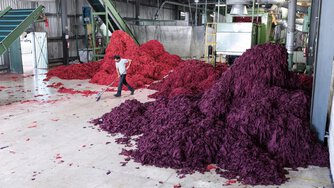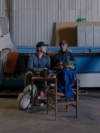
Our Footprint Stories

Taking responsibility for our supply chain impact means working with our partners, the wider industry, governments and NGOs to address root causes. Here’s how we are working to support the people who make our products.

Introducing Home Planet Fund, an independent nonprofit that supports local and Indigenous communities who work in concert with nature to stop climate breakdown.

Since we first learned of the role we play in the spread of microfiber pollution in 2015, Patagonia has actively searched for partners to help end—or at least seriously curtail—the spread of synthetic fiber waste into the air and water. We’ve long been familiar with the microplastics problem—the breakdown of plastic bottles, yogurt cups and…

Trying to address the climate crisis without the ocean will not work.

Perfluorinated chemicals, or PFAS, made for great waterproofing but are also a lasting, pervasive threat to our health. That’s why we spent nearly 15 years finding a way to make our gear without them that didn't compromise performance. By 2025, all our DWR finishes will be made without PFAS.

The South Pacific has a plastic problem. He had a truck.

What’s the secret to a really good pair of jeans? Comics journalist Sarah Mirk tells us what to look for and how to keep them in play longer.

When it comes to making more responsible jeans, our work is never done. And, of course, we leave the really dirty work to you.

Tough and uncertain, organic cotton farming accounts for less than 1 percent of US cotton production. For this family, that’s why it’s a calling.

The story of our switch to organic cotton starts with a bout of headaches and a trip to the lunar landscape of the San Joaquin Valley’s conventional cotton fields.

Patagonia’s journey toward zero waste and reduced carbon emissions, failed experiments included.

Why we rely on lab tests and data more than ever to make decisions about our products.

What was once a nuisance—overselling environmental gains—now conceals the apparel industry’s role in the climate crisis.

Patagonia’s quality rating system is designed with ecological footprint in mind. Here’s why.

In 2008, two little-known farmers, Perrine and Charles Hervé-Gruyer, decided to embrace the principles of permaculture. 12 years later, the success and lessons of Bec Hellouin Farm spark a movement in Europe.

How discarded plastic fishing nets found their way into our hat brims.

This is the story of how Bureo locked arms with Patagonia to keep 71,000 pounds of discarded fishing net waste out of the ocean each year by putting it into our hat brims. Introducing the traceable, 100% recycled NetPlus®.

Donald Sanderson launched the country’s first mandatory curbside recycling program in Woodbury, New Jersey, in 1980. The recycling landscape has since changed. A lot. Is it still worthwhile?

This is a test to grow our clothes differently.

Can a cotton T-shirt really help stop the climate crisis?

She went to Italy to see how recycled wool is made and discovered that everything has an impact, including recycled.

Our home planet has a deeply disturbing and pervasive problem with plastics. In April, a group of researchers studying the deepest part of the ocean—the Mariana Trench—discovered plastic bags and candy wrappers floating nearly seven miles below the surface of the Pacific Ocean. Globally, about 450 million metric tons of plastic are produced every year and 9.5 million tons of…

It’s hard not to notice the hype around hemp today. Pick up any lifestyle magazine, enter a pharmacy, talk to a health-food store employee or just the person next to you in yoga class—at some point you’ll learn about its miraculous powers. In particular, near-unbelievable claims swirl around cannabidiol, or CBD, oil derived from hemp:…

Yvon Chouinard shares how our company continues to do what it can to defend the soil, air and water we all depend on—and to confront the greatest threat to our welfare we’ve ever faced.

Together with industry partners, Patagonia commissioned Ocean Wise’s Plastic Lab to investigate microfibers, the tiny textile particles that shed from garments over their lifetime. The scientists at the Plastic Lab have just completed the first phase of this research project, so we asked them for an update. While plastic debris in the ocean has rightfully…

Behind everything we make is the hard work of a human being—from growing raw materials and weaving fabric to cutting and sewing the finished product. Yet those who work in garment factories—and, globally, more than 60 million people do—have historically been subject to substandard working conditions and unable to report those issues. That’s why, in…

In 2015, we made the conscious decision to put a pause on our wool sourcing “until we can assure our customers of a verifiable process that ensures the humane treatment of animals.” We are happy to have accomplished our goal and to update you that as of fall 2018, all of the wool in our…

Looking back on the USDA meeting in Jacksonville, I am left with anger, grief and a sense of urgency that we keep moving forward. The meeting of the National Organic Standards Board (NOSB) was an historical turning point for the National Organic Program (NOP). It was a watershed moment. “All of the organic philosophy is…

We started developing our social responsibility program in the mid-1990s, working side by side with factory partners. In 2001, we became a founding member of the Fair Labor Association, a nonprofit that works to improve working conditions worldwide. With over a decade of close focus on our cut-and-sew factories, in 2011, we moved one link…

For almost 20 years since the “organic” certification first passed, there has been a debate surrounding growing methods. Some foods are grown in soil, and others are grown hydroponically in large buildings and under lights. There is a reason for both growing methods, but it is important that they be labeled differently. Since the 1920s…

Working closely with Rodale Institute, Dr. Bronner’s and other key allies, we created Regenerative Organic Certification to establish a new, high bar for regenerative organic agriculture. The certification is the result of a lively and cooperative effort among a coalition of change-makers, brands, farmers, ranchers, nonprofits and scientists, all with a clear goal: to pave…




